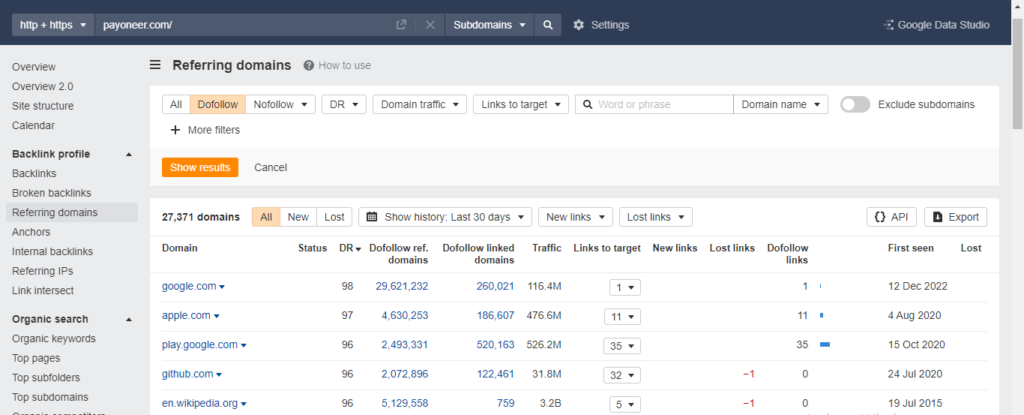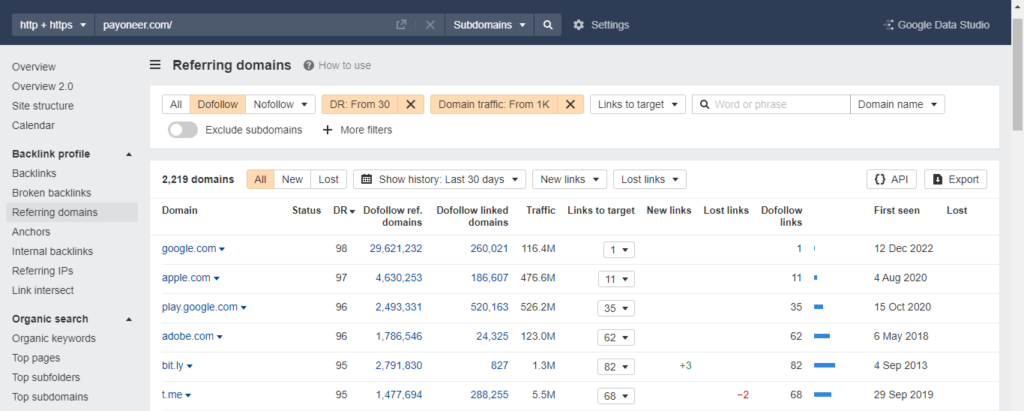In one of our recent articles, link building pricing, we discussed the cost of link building campaigns.
Since then, we have received several questions on what justifies the prices quoted from the business angle. Here are the top picks:
- Why should you spend $70-370 on a link?
- Say you eased up and coughed up that amount. What’s the ROI? Is there a baseline you can work with?
- More importantly, how can you calculate your link building ROI?
In this piece, we shall provide answers to the questions. Even better, we’ll guide you on how to get the best ROI on your link building campaigns.
So, shall we get started?
Before we delve into the calculations, let’s set some foundational basics.
Getting The Basics Rights: What Must Do Before Investing In A Link Building Campaign
Whether link building or any other business, investing even $1 without knowing the basics of what you’re doing is unwise.
Mind you, having a website is not all there is to link building and SEO generally. There is more than meets the eye.
Nevertheless, we’ll summarise what you need to set up your business for a profitable link building ROI:
- Before link building
- Asking the RIGHT questions
Before Link Building
Before hiring a link builder or starting a campaign, there are three things you must get right:
- Content creation
- On page optimization
- Conversion optimization
Content Creation
Whether in SEO or social media, content is crucial to gaining attention. The same precepts apply to link building.
For your linking building to be successful and profitable, the content that carries the backlink or is linked to must be high-quality. It must be a linkable asset.
Bottom line: you need quality content.
What makes content “quality”?
Quality content provides value, engages, informs, and persuades. It revolves around the users’ intent and hooks the reader in naturally.
You might argue that some articles rank on search engine results but are 100% worthless. Yes, that happens.
But let’s ask a quick question:
Despite what’s on page 1 on search results, will you buy or subscribe to a channel based on worthless content?
Your answer is probably a “no.”
The same principle applies to any random user. So say you successfully get backlinks without quality content and rank high on search results. The positions won’t be sustainable because the foundation is not solid.
Worse case: your bounce rate will skyrocket and tank the so-called rankings.
On-page Optimization
Writing informational, navigational, commercial, or other types of content is awesome. But there is more to ranking high on search results than just “writing.”
BTW, your competitors are “writing.” And as much as you want to play down the competition, it does exist.
In summary, your content needs help. That is where on-page optimization comes into play.
What’s on-page optimization?
It means “writing your content to meet users’ intent while banking on trusted strategies.”
By “trusted,” we mean what others in the industry have done with results.
Going about this phase manually can be a heck of a job. Fortunately, there are tools you can use.
Recommended tools: Surfer, Neuronwriter, and RankIQ
Note:
On-page optimization doesn’t stop at just the content itself. It includes meta description, image optimization, website architecture, and interlinking.
Conversion Optimization
On-page optimization focuses on the content part. But that’s not all this is involved in converting a prospect into a customer: the result you expect from your investment.
Your website also needs to be optimized. What part?
- Start with the website speed. Follow Google Search Console recommendations to fix your speed issues.
- Mobile responsiveness is another crucial factor to consider. The chances are that your prospects are checking you out from their smartphones. So, ensure your site offers a similar experience on mobile as on desktop.
- Call to action (CTAs) is the little pointer that moves the needle. They are phrases that indicate what the readers must do. Else, the readers will remain readers and not be converted — traffic will remain unexplored.
Pro tip:
your CTAs don’t have to be 100% commercial. They can be as simple as “joining a mailing list,” “subscribing to a newsletter,” “downloading an ebook,” or “getting FREE inspection.”
Moving away from the fundamentals, let’s ask more link-building-focused questions.
Asking The RIGHT Questions
To get a close estimate of your link building ROI, you must ask questions about profitability, resources, and strategies.
We will break down the essentials into the questions below for easier comprehension:
- What are the likely risks or rewards?
- What type of links should you build?
- How difficult is your business case?
Risks And Rewards
To analyze the risks/rewards of your link building campaigns, you must look at the factors below:
- Traffic likelihood
- Industry and location
- Profit expectations
- Scalability
Traffic Likelihood
Before anything, you must establish how much traffic you can generate. Otherwise, you might set your campaign for “loss” before it begins.
So, check if your desired keywords are as esteemed as you thought? What’s the organic traffic for the keywords?
Solution: use Ahrefs; it does competitor and keyword research!
Why Ahrefs?
Ahrefs often underquote traffic; that is brilliant for planning your campaigns. Since you’re already working below the REAL benchmark, you won’t be disappointed.
Note:
Chances are that some keywords have zero traffic. That doesn’t mean such won’t have a great ROI.
Even at that, don’t make such keywords the backbone of your business – especially if you’re starting out or with a strained budget.
Industry & Location
In a saturated industry, your chances of realizing profitable ROIs on your first few campaigns are slim. And mind you, the “chances” might never be encouraging after several campaigns.
In other words, you must choose your competition wisely. But often, you will have little to no control over that.
So, what can you do?
Flex your budget to the limit and have a long-term approach.
Beyond industry, your location also matters. The more the population in your city, the higher the number of established competitors.
Either way, do competitor research before embarking on a link building campaign. Ask these questions:
- What is the average backlink profile of your competitors?
- What kind of markets does the business tend to?
- Are the businesses local, national, or international?
Profit Expectations
You have seen your competitors and the traffic likelihood for your desired keywords. Now, what do you think?
Be realistic; can you make any profit on the metrics?
Say you even rank for the keywords. Is the niche lucrative? Or should you look elsewhere?
The way out: study your industry’s influences before investing in link building. SaaS players seem to be doing fine though.
With a product and a group of recurrent subscribers, you can market a fortune — even if the subscription is a few hundred bucks.
Pro tip:
Even as SaaS, be wary of the markets. If you’re a newbie in fintech, for example, you’d hardly topple the likes of Payoneer [with 1.4M organic search traffic and ranking for 89.4K keywords].
You might be best served with other techniques like influencer marketing.
Scalability
Even when your business is profitable, you must ensure the profits realized are not one-offs. Can you be on a recurring system?
More importantly, can you scale the profit to, say, x7?
Still using the SaaS example: as a newbie in fintech, you can start with aiding payment for freelancers in your locale. With enough hype behind you, you can scale up and also assist corporate businesses.
Even better, you can add new services and rank for several keywords.
Unfortunately, that approach might be non-applicable for local niche businesses — especially in the medical niche. For example, you have limited keywords as an otolaryngologist (someone who diagnoses and treats ears, mouth, nose, and throat).
Pro tip:
You can’t scale beyond your local competition as a local business. It is wise to stop investing in link building once you reach the zenith — especially if the niche is not competitive. Management services will suffice in that case.
Knowing The Links To Build
This section focuses on the question of the “resources.” In particular, it will reveal how many links you must build to compete against the big guys in the industry.
For that, you need a competitor link analysis. Why?
You must know the edge your competitors have over you. Specifically, how many backlinks are linking back to them? How many referring domains?
Still using our fintech example: Payoneer
- Let’s plug Payoneer into Ahrefs Site Explorer
- Click “referring domains” under the “Backlink profile” tab to the left
- Filter the results by “Dofollow” — they are the links that could influence ranking on search results

27k domain is a lot; trim down the results to show only the quality domains.
- Add filters DR (from 30) and Domain traffic (from 1k).

Though the results show 2219 domains, you can start competing with at least 1000-1500 quality links.
Even better, target the domains on the results.
Pro tip:
You could use the “content explorer” method to analyze the top-ranking articles for your keyword. The process is the same. Cheers!
Difficulty Of Your Business Case
From our examples so far, you can tell that all industries and businesses are not the same. While some might have higher ROI on link building, the approach might be unwise for others.
Besides, some projects are just straightforward. For example, imagine you only have to land a client per year who will pay you $50k.
The risk of investing in link building is considerably low for such instances. When it works, the business will have a lifetime client, and that will cover the resources and time spent.
Then, some businesses need to close several clients to reach the $500 mark per month. Oddly enough, competitors here will be much because the entry point would easily be affordable.
In this case, investing heavily in link building might be risky.
Now, let’s see how to calculate the ROI on your link building campaigns.
How To Calculate Your Link Building ROI
There are different methods to estimate your link building ROI. The easiest of the lot is the revenue-per-visit model.
As the name suggests, you’ll pitch your revenue against your site’s monthly traffic.
For example, say you added 10 backlinks and got 100 people to visit your site monthly, and your monthly proceeds were $2000.
Your revenue per visit model is $20.
In other words, increasing the backlinks to 20 will result in x2 your revenue per visit.
Unfortunately, the model doesn’t factor in the resources spent to reach your revenue. Also, it doesn’t consider extra efforts like follow-up emails.
So, let’s use another model that is encompassing.
- First, check how many links you need to create using the competitor link analysis.
- Ascertain how much you’ll spend per link.
- Start the campaign on a small scale to see how many leads you can convert per visit and follow up.
- Get an average for at least 3 months
- Now, use this formula:
(Net income/cost of investment) X 100
Note:
include all the expenses invested — even the extra costs of sending follow-up emails. That’s how to get the exact ROI.
You might argue that the second method is time-consuming. Yes, but it’s better to ascertain if a strategy will work on a small scale than go all in and get burned.
Nevertheless, you can skip the time-consuming stage if you outsource link building.
Who Should Handle Your Link Building Campaigns?
Luckily, there are several agencies you can outsource your campaigns to. You can use any of the following agencies:
- Content marketing agencies,
- Digital PR agencies, or
- Specialized link building agencies
All the agencies have their pros and cons, and you’d get a relatively better ROI than a DIY approach. However, choose a link building agency if you have a tight budget.
Besides being relatively affordable, link building agencies are link builders through and through. They understand and have mastered several strategies — content marketing and PR techniques inclusive.
Don’t know which link building agency to trust?
Serpreach can help. We offer tailor-fit premium link building services.
Whether you’re an SEO agency that needs white-label services or a corporate organization, we can help.
Set up a quick meeting to discuss your needs!
Bottomline
Truly, link building has its benefits. However, establish where your business is and the expected ROI first before investing your hard-earned money.
If the projected ROI matches your expectations, give link building a go. Otherwise, seek an expert for guidance on alternative strategies to implement.

